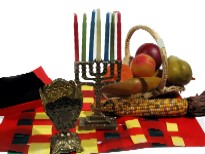A Brief History of Kwanzaa
Holidays Trivia All holidays were invented at one time or another– Kwanzaa is probably the newest. Kwanzaa was born during the turbulent Sixties, in a time when Black Americans were demanding -and finally receiving- their civil rights. 1966 was a year of mighty changes; people who marched, attended sit-ins and generally raised a ruckus actually did change the world.
All holidays were invented at one time or another– Kwanzaa is probably the newest. Kwanzaa was born during the turbulent Sixties, in a time when Black Americans were demanding -and finally receiving- their civil rights. 1966 was a year of mighty changes; people who marched, attended sit-ins and generally raised a ruckus actually did change the world.
Kwanzaa was dreamed up by Dr. Ron Everett Karenga and the first Kwanzaa was celebrated from December 26, 1966 through January 1, 1967. Doctor Karenga, known as ‘Maulana’ (Swahili for ‘master teacher’) saw that Black Americans were often economically unable to participate in the consumer-fest that Christmas had become. He also saw the need for Black Americans to have something entirely their own. Thus Kwanzaa was born.
Kwanzaa is a week-long celebration based on seven principles for living. Each is celebrated for one day and hopefully practiced throughout the rest of the year. These seven principles, known collectively as ‘Nguzo Saba’ are, in brief: Unity, Self-Determination, Collective Responsibility, Cooperative Economics, Creativity and Faith. These principles are discussed, meditated upon and taught to the children.
As with all holidays, Kwanzaa has its own significant symbols. Each home sets up a sort of altar with symbols and offerings placed upon a straw mat known as ‘Mkeka’. There is a candle holder and seven candles, usually in shades of black, red and green. One candle is burned each night, as the principle of the day is celebrated. An ear of corn is laid on the mat to represent the children of the extended family.
There is a unity cup called ‘Kikombe Cha Umoja’ on the mat, symbolizing the ancestors– it is raised in remembrance and each person present takes a sip. Simple gifts are given to the children to reward them for acts of goodness and beauty. Parents dedicate the little ones to lives of goodness, especially in their acts, thoughts and school grades. On December 31, the extended family gathers for a wonderful feast known as ‘Karamu’. There is much celebration, with dancing and singing and general merriment.
Even though Kwanzaa is a relatively new holiday, it is sure to remain — This wonderful and positive week-long celebration gives Black Americans a unique holiday and special way of teaching their children important principles of goodness and honor.
